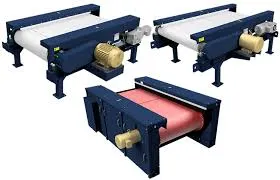

Dec . 24, 2024 13:08 Back to list
Steel Scrap Processing Plant A Vital Component of the Circular Economy
The steel industry is one of the most significant contributors to global economic development, but it also poses considerable environmental challenges. As the world becomes more conscious of sustainability, the importance of steel scrap processing plants has surged. These facilities play a crucial role in recycling steel scrap, reducing waste, and minimizing the carbon footprint associated with steel production.
Steel scrap processing involves the collection, sorting, shredding, and melting of scrap metal to produce new steel products. The lifecycle of steel is an integral part of the circular economy, which emphasizes the reuse and recycling of materials. Steel, being one of the most recycled materials globally, can undergo an endless number of cycles without losing its quality. According to the World Steel Association, about 85% of steel can be recycled continuously, which makes scrap processing plants essential for modern steel production.
One of the significant benefits of steel scrap processing plants is their capacity to reduce the reliance on virgin materials. Extracting and processing raw materials, such as iron ore, consume vast amounts of energy and contribute to greenhouse gas emissions. In contrast, recycling steel scrap consumes only a fraction of the energy—approximately 74% less than producing new steel from ore. Moreover, utilizing scrap steel helps conserve natural resources, reduces mining impacts, and mitigates the environmental concerns associated with traditional steel manufacturing.
The operation of steel scrap processing plants involves advanced technologies that enhance efficiency and productivity. Modern plants utilize sorting technologies, including magnets and eddy current separators, to effectively segregate ferrous and non-ferrous materials. After sorting, the scrap is shredded into smaller pieces, facilitating easier melting in electric arc furnaces (EAFs). EAFs represent a significant innovation in the industry, enabling the production of steel with lower emissions and energy consumption. By integrating sophisticated machinery, such as automated conveyor systems and real-time monitoring tools, these plants optimize operations and ensure the high quality of the end product.

In addition to environmental benefits, steel scrap processing plants also contribute to local economies. They create jobs and stimulate economic activity in their communities. The recycling industry is labor-intensive, requiring skilled workers for various tasks ranging from sorting and processing to quality control. By providing employment opportunities, scrap processing facilities can bolster local economies while promoting a sustainable industrial landscape.
Furthermore, the rise of the circular economy creates new opportunities for innovation within the steel scrap processing sector. Companies are increasingly exploring ways to improve efficiencies, reduce waste, and enhance the recovery of valuable materials. Innovations in logistics, data analysis, and automation are transforming the way scrap is collected and processed. This evolution is vital as the demand for steel continues to grow globally, driven by infrastructure development, construction, and technological advancements.
Despite the numerous advantages, steel scrap processing plants also face challenges. Fluctuating market prices for scrap metal can impact profitability, and regulatory barriers may pose obstacles to growth in some regions. However, with increasing awareness of sustainability issues and the continuous push towards greener practices, the outlook for steel scrap processing remains bright.
In conclusion, steel scrap processing plants are indispensable in the journey towards a more sustainable and circular economy. By recycling steel scrap, these facilities help conserve resources, reduce emissions, and support local communities. As technology advances and the global demand for steel rises, the role of these plants will only become more critical, emphasizing their importance in both environmental stewardship and economic resilience.
Latest news
Troubleshooting Common Eddy Separator Problems
NewsJul.04,2025
The Role of Metal Recycling Plants in Circular Economy
NewsJul.04,2025
The Impact of Recycling Line Pickers on Waste Management Costs
NewsJul.04,2025
Safety Features Every Metal Shredder Should Have
NewsJul.04,2025
How Industrial Shredders Improve Waste Management Systems
NewsJul.04,2025
How Cable Granulators Contribute to Sustainable Recycling
NewsJul.04,2025